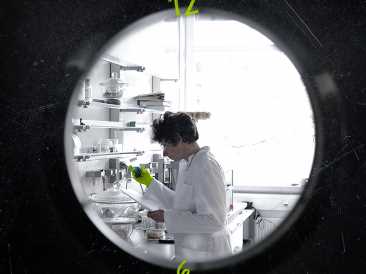Sickle cell disease: Investigating a new drug

- Sickle cell disease develops due to a genetic mutation that affects hemoglobin in red blood cells.
- This modified version of hemoglobin carries less oxygen and leads to rigid, distorted cells, which can block blood vessels.
- A drug candidate called FTX-6058 restores the body’s ability to produce fetal hemoglobin, which is normally produced in only small amounts after birth.
- A phase 1 clinical trial in healthy volunteers found that the drug is safe.
- The researchers are planning a phase 2 clinical trial, scheduled to start in patients in late 2021.
Sickle cell disease is a group of inherited disorders that affect red blood cells.
Healthy red blood cells are flexible discs. In people with sickle cell disease, however, they are rigid and C shaped, resembling a sickle.
These cells are shorter-lived than healthy red blood cells and can get stuck in small blood vessels. Not only are the blockages painful, but they also increase the risk of stroke, heart disease, kidney failure, and other life threatening conditions.
The root cause of sickle cell disease is a genetic mutation that produces a modified version of the oxygen-carrying molecule hemoglobin in red blood cells.
According to the
The condition is relatively rare among white people in the U.S., but around 1 in 365 Black people there are born with the disease.
These individuals have in their cells two copies of the gene that has undergone a mutation. Yet around 1 in 13 Black people in the U.S. carry a single copy of the gene and show few, if any, symptoms.
Currently, the only cure for sickle cell disease is a stem cell or bone marrow transplant. However, according to the
Scientists at the American biotech company Fulcrum Therapeutics, based in Cambridge, MA, are exploring an alternative strategy.
Restoring fetal hemoglobin
Humans produce an alternative version of hemoglobin in the womb, which is called fetal hemoglobin, but its production normally greatly reduces shortly after birth.
This explains why people with sickle cell disease do not start to develop symptoms until 3 or 4 months after they are born.
However, about 1 in 1,000 Black people in the U.S. continue to produce greater than usual amounts of fetal hemoglobin into adulthood.
This is called hereditary persistence of fetal hemoglobin, and it can protect people who inherit the modified gene for adult hemoglobin.
“They have the sickle cell mutation, but additional mutations result in continued expression of fetal hemoglobin into adulthood,” says Dr. Christopher Moxham, chief scientific officer at Fulcrum.
With fetal hemoglobin levels at around 25–30% of usual adult hemoglobin levels, these individuals may not show any symptoms of the disease.
Dr. Moxham and his colleagues have now developed a drug called FTX-6058, which mimics hereditary persistence of hemoglobin.
The drug, which people can take orally, targets stem cells in the bone marrow that are destined to become red blood cells.
It works by inhibiting a protein in the cells that typically “silences” or switches off the gene that produces fetal hemoglobin shortly after birth.
In experiments on a mouse model of sickle cell disease, the scientists found that the new drug outperforms hydroxyurea, an existing medication that boosts fetal hemoglobin.
Every red blood cell
“What is really key is FTX-6058 upregulates fetal hemoglobin across all red blood cells, a pancellular distribution,” says Dr. Ivan V. Efremov, senior director and head of medicinal chemistry of Fulcrum.
The idea is that every red blood cell in the body will produce fetal hemoglobin.
“If some red blood cells did not express this, they could still sickle and cause disease symptoms,” Dr. Efremov explains.
Fulcrum has completed the phase 1 clinical trial of the drug in healthy volunteers, and it demonstrated that the drug is safe.
Dr. Efremov presented the results at the online spring conference of the American Chemical Society on April 9, 2021.
It is worth noting that the drug has not been tested in people with sickle cell disease. However, the company plans to start a phase 2 clinical trial of the drug in people by the end of 2021.
The results of the phase 1 trial have not yet been published, but an abstract provided by the company can be found at the end of this press release.
Source: Read Full Article
